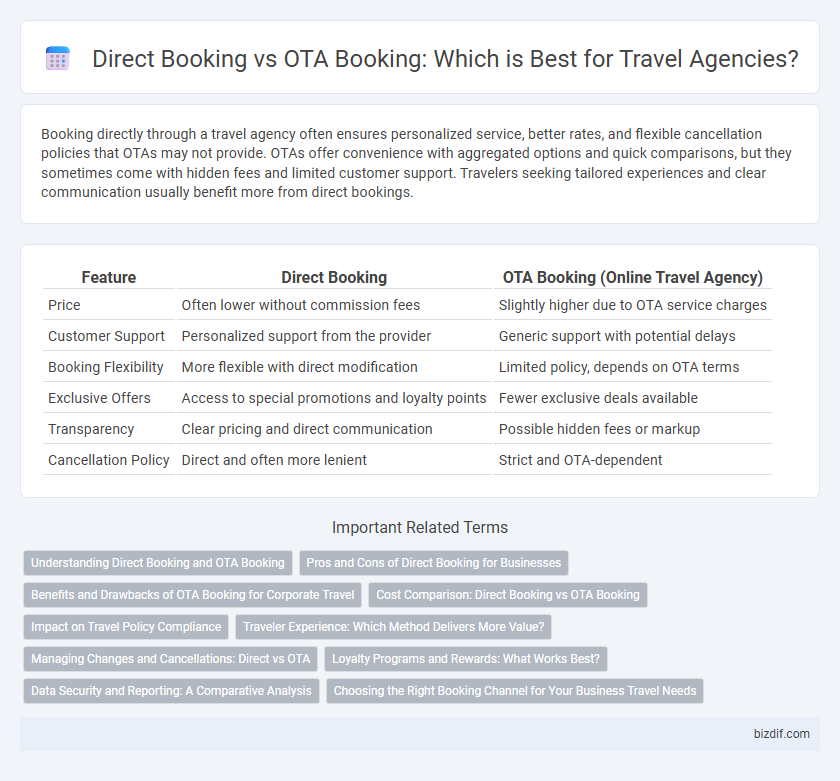Booking directly through a travel agency often ensures personalized service, better rates, and flexible cancellation policies that OTAs may not provide. OTAs offer convenience with aggregated options and quick comparisons, but they sometimes come with hidden fees and limited customer support. Travelers seeking tailored experiences and clear communication usually benefit more from direct bookings.
Table of Comparison
| Feature | Direct Booking | OTA Booking (Online Travel Agency) |
|---|---|---|
| Price | Often lower without commission fees | Slightly higher due to OTA service charges |
| Customer Support | Personalized support from the provider | Generic support with potential delays |
| Booking Flexibility | More flexible with direct modification | Limited policy, depends on OTA terms |
| Exclusive Offers | Access to special promotions and loyalty points | Fewer exclusive deals available |
| Transparency | Clear pricing and direct communication | Possible hidden fees or markup |
| Cancellation Policy | Direct and often more lenient | Strict and OTA-dependent |
Understanding Direct Booking and OTA Booking
Direct booking involves reserving travel services such as flights, hotels, or tours directly through a travel agency's website or customer service, often offering better rates and personalized customer support. OTA booking refers to using Online Travel Agencies like Expedia, Booking.com, or Agoda, which aggregate multiple providers to offer a wide range of options but may include additional fees or less flexible cancellation policies. Understanding these two booking methods helps travelers optimize cost, convenience, and service quality when planning their trips.
Pros and Cons of Direct Booking for Businesses
Direct booking offers travel agencies higher profit margins by eliminating OTA commission fees and fostering stronger customer relationships through personalized service. The approach enhances brand loyalty and allows greater control over pricing and inventory management, optimizing revenue streams. However, investing in user-friendly booking technology and robust marketing strategies is crucial to attract and retain customers without the visibility provided by large OTAs.
Benefits and Drawbacks of OTA Booking for Corporate Travel
OTA booking for corporate travel offers convenience through real-time price comparisons and extensive options across airlines, hotels, and car rentals, often resulting in cost savings and streamlined expense management. However, drawbacks include limited personalized support, less flexible cancellation policies, and potential issues with itinerary changes, which can disrupt business schedules. Companies must weigh the efficiency and competitive pricing of OTAs against the need for tailored customer service and direct supplier relationships.
Cost Comparison: Direct Booking vs OTA Booking
Direct booking with a travel agency often results in lower overall costs due to the elimination of third-party commission fees that Online Travel Agencies (OTAs) typically charge. OTAs may appear to offer competitive prices but frequently include hidden service charges or less flexible cancellation policies that increase total expenditure. Booking directly ensures transparent pricing, exclusive discounts, and potential access to loyalty rewards that reduce travel expenses effectively.
Impact on Travel Policy Compliance
Direct booking enhances travel policy compliance by allowing companies to enforce approved vendors and negotiated rates, reducing off-policy spend and ensuring accurate data capture for reporting. OTA booking often leads to fragmented itineraries and increased risk of non-compliance due to varied pricing and limited policy control. Firms prioritizing compliance benefit from direct booking platforms integrated with corporate travel policies and real-time monitoring tools.
Traveler Experience: Which Method Delivers More Value?
Direct booking offers travelers personalized service, better price transparency, and easier modifications, enhancing overall satisfaction and trust. Online Travel Agencies (OTAs) provide a vast selection of options and competitive deals but may involve hidden fees and less flexible customer service. Evaluating traveler preferences for convenience, control, and cost savings determines which booking method delivers more value in the overall experience.
Managing Changes and Cancellations: Direct vs OTA
Direct booking with a travel agency offers more flexible options for managing changes and cancellations, often featuring personalized support and fewer restrictive policies compared to OTA (Online Travel Agency) bookings. OTAs typically have standardized rules and may charge additional fees or have less transparent cancellation processes, resulting in potential delays and extra costs. Travelers seeking hassle-free modifications and refunds should prioritize direct bookings to ensure better control and customer service.
Loyalty Programs and Rewards: What Works Best?
Direct booking through travel agencies often offers superior loyalty programs and exclusive rewards tailored to individual traveler preferences, enhancing customer retention. Online Travel Agencies (OTAs) provide broad access to various loyalty programs but typically lack the personalized benefits and immediate customer service that direct bookings ensure. Travelers prioritizing consistent rewards and personalized incentives benefit more from booking directly with travel agencies rather than relying on OTAs.
Data Security and Reporting: A Comparative Analysis
Direct booking offers enhanced data security by minimizing third-party access to personal and payment information, reducing risks of data breaches common in OTA platforms. Travel agencies gain more comprehensive and customizable reporting capabilities through direct channels, enabling deeper insights into customer preferences, booking patterns, and revenue management. OTAs typically provide standardized reports with limited granularity, restricting detailed analysis essential for optimizing marketing strategies and improving customer experience.
Choosing the Right Booking Channel for Your Business Travel Needs
Direct booking offers personalized service, exclusive deals, and better control over travel itineraries, ideal for business travelers seeking customization and efficiency. OTA booking provides a wide range of options, price comparisons, and immediate confirmations, beneficial for flexible schedules and diverse preferences. Evaluating factors like cost, convenience, loyalty benefits, and customer support helps determine the optimal channel for your business travel needs.
Direct booking vs OTA booking Infographic

 bizdif.com
bizdif.com